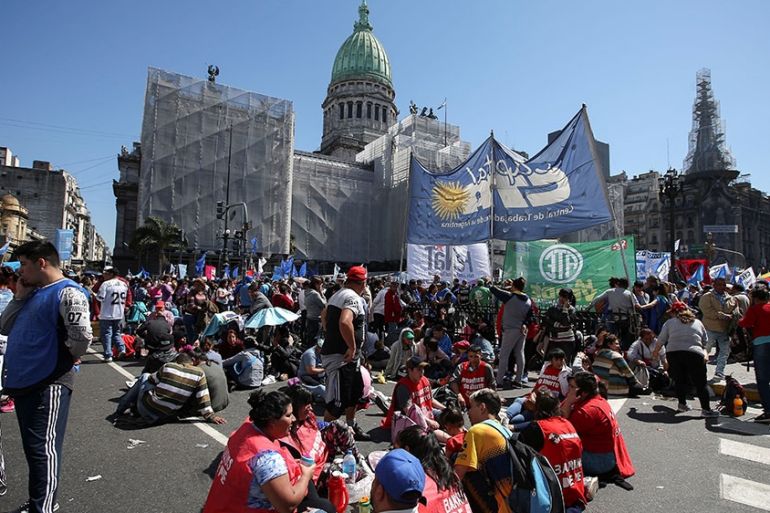Venezuelans in Argentina: From one economic crisis to another
Some Venezuelans in Argentina make a living by taking advantage of a hi-tech, low-skill, but insecure employment niche.

Buenos Aires, Argentina – More than 100,000 Venezuelans now live in Argentina. They have left one country in crisis only to find themselves in another mire. And yet, some of them have managed to earn a living by slotting into a “gig economy” – an employment niche that is fuelled by the hi-tech industry, but that is low-skilled and risky.
Venezuelan immigrants like Edgar Lopez were forced onto this path by economic circumstance. Back in January 2016, Venezuela was wracked by food shortages, leaving Lopez little choice but to emigrate to Argentina.
Keep reading
list of 4 items‘Why should we vote?’ India’s jute workers blame politicians for woes
California farmworkers cheer new housing in town scarred by mass shooting
Russia’s Putin eyes greater support from China for Ukraine war effort
“I had a fast-food shop in Venezuela; I did super spectacular,” Lopez told Al Jazeera. “I took the days around Christmas off. When I wanted to reopen, I found no ketchup, no supplies. I didn’t think twice. I took everything, spoke to some friends in Argentina – and came.”
That year, Lopez and 12,858 of his compatriots moved to Argentina, according to official figures. In 2017, the number of legal new residents from Venezuela climbed to 31,167. Last year, 70,531 people fled Venezuela for Argentina.
It is relatively easy for Venezuelans to enter Argentina and obtain legal residency and work permits, compared to other countries in the region. Nevertheless, life in Argentina is not easy for the vast majority of these immigrants.
A persistent recession with high inflation, growing Argentine unemployment – and a 25-percent currency collapse in a single day last August – make finding a job incredibly difficult for most people who live in the South American country. As of the first quarter of this year, one out of every 10 Argentines who wanted to find a job could not.
“The economic crisis worsened the destruction of legal employment,” said Elva Lopez Mourelo, an officer in inclusive labour market institutions at the International Labour Organization (ILO) in Buenos Aires.
Despite having their papers in order- and in some cases despite having advanced higher education -increasing numbers of Venezuelans cannot access Argentina’s shrinking labour market.
Still, the scale of the Argentine economic downturn is mild compared to Venezuela’s catastrophic crisis.
The International Monetary Fund estimates that Argentina’s economy will shrink by 1.2 percent in 2019. Venezuela – hit by sanctions, wracked by a political crisis, and having fallen into economic ruin years ago – is forecast to lose some 25 percent of its already aneamic output this year.
Digital economy and risk
Some Venezuelans have created their own opportunities in Argentina’s emerging “gig economy” by working as app-based delivery drivers.
“These digital platforms, that have very flexible and fast employment possibilities, appeared when there were migrants with a need to find work,” Lopez Mourelo said.

Like gig workers all around the world, those in Argentina don’t garner the social benefits that full-time workers enjoy, such as severance pay, unemployment insurance, paid vacations and high-quality medical services. Gig workers operate in a grey area as independent suppliers.
With few opportunities and often-invalid education credentials in most sectors, Venezuelans have flocked en masse to this emerging sector.
Some 71 percent of app-based delivery drivers in Argentina come from Venezuela, according to a recent study by ILO. Most people who order a pizza or anything through an app in Buenos Aires are likely to have it delivered by someone with a strong Venezuelan accent – which is clearly distinct from the Italian cadence that characterises Argentine Spanish.
The ILO study focused on well-advertised apps, whose riders cruise streets and avenues by bicycle and motorcycle in brightly coloured uniforms.
This work can be tough. Some 17 percent of gig delivery drivers have suffered some kind of workplace accident and more than 20 percent have been robbed while on the job, according to the study. The business owners who use these gig workers have no legal obligation to provide support services to those who are injured or sick.
“They work many hours taking very high risks,” Lopez Mourelo said.
After working in construction and in a shop, Edgar Lopez decided to pick up gig work as a delivery driver. He now crisscrosses Buenos Aires on his motorbike, primarily ferrying food. His shifts don’t extend beyond 10 hours, and he is able to plan his downtime some days in advance.
“They call me ‘the old guy’,” he said, explaining how he stays safe by riding slowly on his motorbike. “Many [delivery drivers] have no conscience. They score many more deliveries, but ‘fly’ around town.”
Lopez makes about $850 a month, far more than he would earn in comparable low-skilled jobs in Argentina. He combines multiple flexible work shifts with a second job as a part-time janitor.
“I send everything to my mother [and family] in Venezuela,” Lopez said. “Without my help, they would starve.”
Should he fall ill or suffer an accident, he has no social or labour protection, and his income would stop until he is fit to ride again.
But Lopez is still earning a steady income, which is becoming more difficult in Argentina.
“Wages in real terms have been falling nationally for eight months,” said Martin Montane, a labour market researcher at Universidad Torcuato Di Tella in Buenos Aires.
Montane has detected a 12-percent fall in real wages during the 12 months leading up to August, and he estimates a further growth of the unemployment rate to more than 11 percent in 2019.
For Lopez, options are limited, but he finds this more palatable than working under the full protection of labour laws.
“For those who work under a formal contract, they have to work longer hours than me,” Lopez said. “They make $320 a month. There may be benefits, but I don’t want them.”